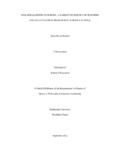
Please use this identifier to cite or link to this item:
https://hdl.handle.net/20.500.14301/142| Title: | TEACHER LEARNING IN SCHOOL: A NARRATIVE INQUIRY OF TEACHERS AND HEAD TEACHERS FROM PUBLIC SCHOOLS IN NEPAL |
| Authors: | Kandel, Khim Prasad |
| Citation: | Kandel, K.P.(2022).Teacher learning in school: A narrative inquiry of teachers and head teachers from public schools in Nepal. |
| Issue Date: | Sep-2022 |
| Publisher: | Kathmandu University School of Education |
| School: | SOED |
| Department: | DOEL |
| Level: | M.Phil. |
| Program: | MPhil in Educational Leadership |
| Abstract: | The research topic Teachers’ Learning in School: A Narrative Inquiry of Teachers and Head Teachers from public Schools in Nepal sprouted from my involvement in the field of teacher training for more than a decade with public and private schools in different regions of Nepal. Over a decade of working with the various educational actors, my reflections sometimes leave me discouraged to observe the lack of motivation teachers’ exhibit to learn new skills to instruct students. In some cases, I also experienced that the junior teachers are afraid, uncomfortable, and shy to seek help from senior teachers. There was a lack of collaborative learning culture and a lack of passion for being a lifelong learner attitude among the teachers and school leaders. This study aimed to explore how teachers learn from each other in their schools settings and how head teachers facilitate teachers’ learning in public schools in Nepal. For this purpose, two research questions were generated: first, how do teachers narrate their understanding of learning (self-learning and shared learning) in Nepali school settings? Second, how do head teachers facilitate learning in Nepali schools? I applied narrative inquiry as a research method and adopted an interpretive paradigm relating to my ontological, epistemological and axiological stance. Information was collected using open-ended interviews over the phone from a purposeful sample of three teachers and three head teachers because of the effect of COVID-19 pandemic. The participants belonged to the different socio-cultural background and had distinct experiences about learning as a teacher and facilitating learning as a head teacher. The theoretical foundation of the research was guided by Knowles’s (1980) theory of andragogy concerning how adults learn. The key assumptions of this theory provided clear guidance for exploring how adults are motivated to learn. Furthermore, I got various insights from my research participants on how they learn and facilitate learning in their school’s context. I developed some key insights from this research journey. Firstly, I learned that teachers learn in formal and informal settings. Secondly, they learn through self-direction, Thirdly, they learn collaboratively, and finally, they learn when knowledge is applicable to the classroom. Finally, I also learned from the narrative of the headteachers that they facilitate teachers' learning in three ways. Firstly, the head teachers facilitate teachers' learning by creating an academic culture through observing the classroom and providing teachers constructive feedback as well as encouraging collaborative learning to solve problems. Second, head teachers facilitate the learning of teachers by partnering with various organizations to provide access and training for teachers. Lastly, the head teachers facilitate the learning of teachers in schools by being role models as lifelong learners. This study provides significant insights to the various educational actors such as teachers, head teachers, professional development experts and policy makers to understand and reflect how teachers as an adult learner are motivated to learn. At the same time, how can the principles of adult learning be integrated while designing and implementing the teacher professional development programme so that their learning is enhanced and made more meaningful ? |
| URI: | https://hdl.handle.net/20.500.14301/142 |
| Appears in Collections: | Dissertation |
Files in This Item:
| File | Description | Size | Format | |
|---|---|---|---|---|
| KHIM KANDEL FINAL DISSERTATION.pdf | 839.79 kB | Adobe PDF |  View/Open |
Items in DSpace are protected by copyright, with all rights reserved, unless otherwise indicated.